The Ultimate Guide to Fueling Your Body Post-Workout: 10 Dining Tips for Fitness Enthusiasts
Are you a fitness enthusiast itching to unlock your body’s true potential?
We all know the importance of a rigorous workout routine, but do we really understand how to refuel our bodies after an intense sweat session?
Fear not, because this ultimate guide is here to enlighten you on the #1 secret weapon for reaching your peak performance – dining!
Get ready as we serve up mouth-watering tips and tricks that will help you fuel your body post-workout like never before.
Whether you’re a seasoned gym-goer or just starting on your fitness journey, get ready to transform into the ultimate dining connoisseur in pursuit of unstoppable gains.
Let’s dive in!
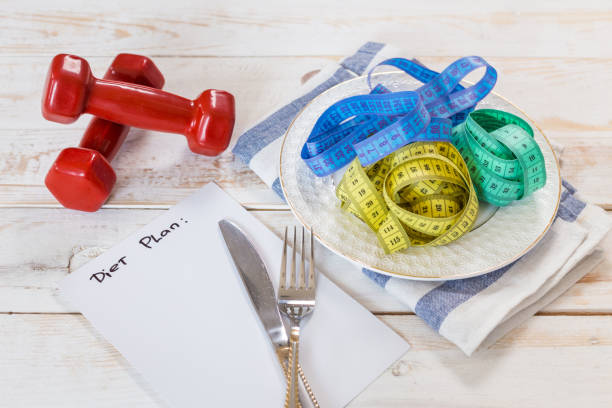
Why Post-Workout Dining Matter?
Regarding fitness, we often focus on physical exertion during our workouts, forgetting that what we do after is just as important.
That’s right – post-workout dining is vital in maximizing your fitness gains!
But why does what you eat after exercise matter so much?
Enhanced Muscle Recovery
Nourishing your body with the right nutrients directly after a workout aids muscle recovery and repair.
Those intense exercise sessions cause micro-tears in our muscles, and the food we consume helps build them back stronger than before.
So whether it’s lean protein for rebuilding or complex carbs for replenishing glycogen stores, fueling up after training ensures quicker and more effective results.
Optimal Metabolism
Post-workout meals are like magic potions that supercharge metabolism.
Exercising already boosts calorie burn by increasing your metabolic rate. Combining exercise with strategic nutrient intake can provide an extra boost.
Foods like green tea, apples, whole grains, and protein-rich foods kick-start thermogenesis (the process of heat production), revving up your calorie-burning engine even further.
Improved Overall Performance
Proper post-workout nutrition enhances overall performance by optimizing energy levels for subsequent workouts.
The right balance of macronutrients fuels your muscles and restocks depleted energy stores so you can power through future exercises with maximum effort.
Next time you conclude that grueling gym session or exhilarating run, remember that each mouth-watering bite has incredible potential to support muscle growth, accelerate fat loss, and elevate performance goals.
So what is the right way to dine after exercise?
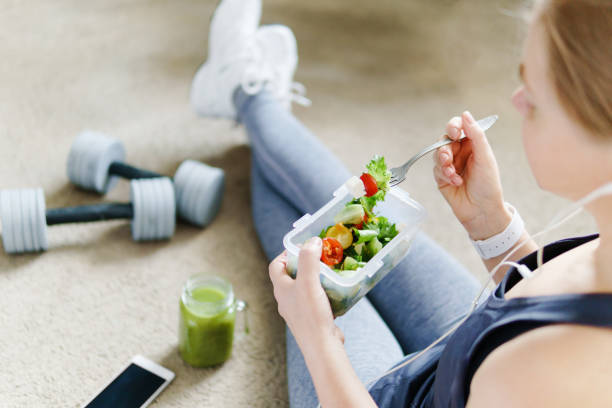
Fuel Up Like a Pro: 10 Nutritious Dining Tips for Post-Workout Recovery
After a strenuous workout, your body needs adequate nutrition for recovery and growth.
In your quest for fitness, you must pay close attention to what you eat after a workout, just as you do before and during.
Here are ten post-workout dining tips to help you make the best of your training program:
1. Hydrate with Water
After a workout, it’s crucial to replenish your body with fluids to promote recovery and prevent dehydration.
While there are many options for post-workout hydration, water is the best choice for many reasons.
Water Is Readily Available
Unlike other beverages, water doesn’t contain added sugars or calories, making it a healthy and low-calorie option. This is especially important for those trying to lose weight or maintain a healthy diet.
Water Helps Regulate Body Temperature
During a workout, your body temperature rises as you exert yourself.
Drinking water after exercising can help cool your body down and regulate your body temperature.
Cooling your body after exercise can reduce the risk of heat exhaustion and other heat-related illnesses.
Water Promotes Muscle Recovery
When you exercise, your body loses water through sweat, and your muscles may become dehydrated.
Drinking water after a workout can help replenish the water lost during exercise, promoting muscle recovery and reducing the risk of muscle cramps and fatigue. Staying hydrated can also improve your overall athletic performance, allowing you to exercise for longer periods without feeling fatigued.
One common mistake many gym-goers make is relying on sports drinks or other beverages to stay hydrated after a workout. While these drinks may contain electrolytes and other nutrients that can help replenish your body, they also tend to be high in sugar and calories. This can undo the hard work you put in during your workout and make it difficult to achieve your fitness goals.
Water, on the other hand, is a natural and healthy way to hydrate your body. It doesn’t contain any added sugars or calories, making it the perfect post-workout beverage.
Additionally, drinking water can help flush out toxins from your body, promoting overall health and well-being. If you’re looking to improve your fitness routine, staying hydrated with water should be a top priority.
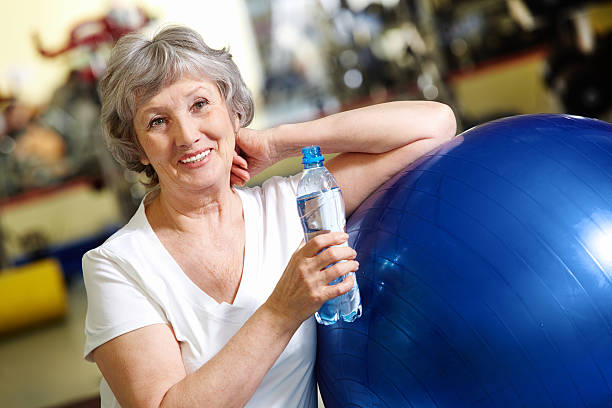
2. Eat Protein
You probably understand the importance of proteins in building and repairing muscles. But did you know that the timing of your protein intake is just as crucial as the amount you consume?
Specifically, consuming proteins after your workout can significantly impact your muscle growth and recovery.
Proteins Promote Muscle Repair
When you exercise, your muscles undergo stress and damage.
Consuming proteins post-workout provides the essential amino acids your body needs to repair and rebuild those damaged muscle fibers.
Without enough proteins, your muscles won’t recover as quickly or effectively, hindering your progress towards your fitness goals.
Proteins Enhance Muscle Growth
Consuming proteins after a workout can also promote muscle growth.
When you lift weights or perform resistance exercises, you create small tears in your muscle fibers.
After consuming proteins, your body uses the amino acids to repair those tears and build new muscle tissue. This process is called muscle protein synthesis, and it’s essential for building lean muscle mass.
But how much protein do you need post-workout?
The answer varies depending on factors such as your body weight, fitness goals, and the intensity of your workout.
A general guideline is to consume 20-30 grams of protein within 30 minutes of completing your workout.
This timing is important because your muscles are most receptive to nutrients and protein synthesis immediately after exercise. After 30 minutes, the rate of muscle protein synthesis decreases, making it less effective for muscle recovery and growth.
While protein shakes and bars are convenient options for post-workout protein intake, natural sources of protein can also be just as effective. Foods such as chicken breast, fish, eggs, and Greek yogurt are all excellent sources of protein that can be easily incorporated into a post-workout meal or snack.
Just be sure to pay attention to portion sizes and avoid overconsumption, as excess protein can be converted into fat and stored in the body.
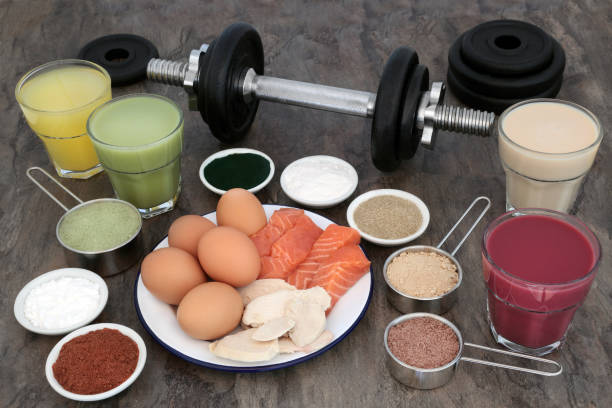
3. Carbohydrates Are Crucial
Carbohydrates are your body’s primary source of energy.
When you work out, your muscles use up their glycogen stores, which are made up of carbohydrates. Replenishing these stores after a workout is crucial to prevent muscle breakdown and promote recovery.
When you eat carbohydrates, your body releases insulin, a hormone that helps to transport glucose (a type of carbohydrate) into your cells. This glucose is used to replenish glycogen stores and provide energy for your muscles.
By stimulating insulin production, carbohydrates help to reduce muscle breakdown.
Carbohydrates can also help to promote muscle growth. When you consume carbohydrates after a workout, your body releases insulin-like growth factor (IGF-1), which is a hormone that helps to stimulate muscle growth. This is why many bodybuilders and athletes consume high-carbohydrate meals after a workout.
But not all carbohydrates are created equal. It’s important to choose the right types of carbohydrates for post-workout nutrition.
Complex carbohydrates, such as whole grains, fruits, and vegetables, are your best bet. They provide a steady source of energy and are packed with vitamins, minerals, and fiber.
Simple carbohydrates, on the other hand, should be avoided after a workout. These include sugary drinks and snacks, such as soda, candy, and pastries. While they may provide a quick energy boost, they can also cause a spike in insulin production, which can lead to a crash later on.
So how much carbohydrates do you need after a workout?
The amount will vary depending on your body weight, workout intensity, and goals. As a general rule, aim for 0.5-0.7 grams of carbohydrates per pound of body weight.
For example, if you weigh 150 pounds, you should aim for 75-105 grams of carbohydrates after a workout.
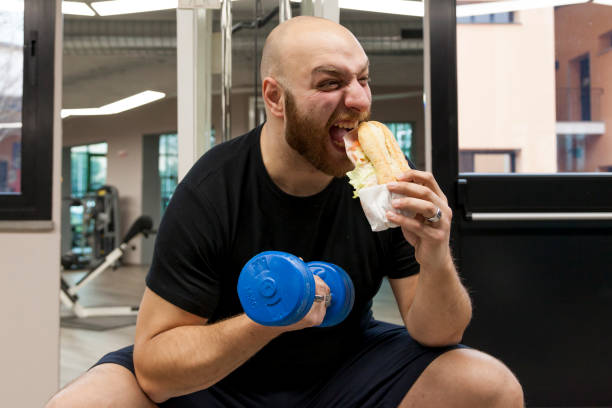
4. Snack on Nuts
Nuts are a great source of protein, which is essential for repairing and rebuilding muscle tissue that is damaged during exercise. This is especially important if you engage in strength training or other high-intensity activities.
Nuts like almonds, pistachios, and cashews are particularly high in protein, with around 6-7 grams per ounce.
By snacking on nuts after your workout, you can help your muscles recover and grow stronger. In addition to protein, nuts also contain healthy fats that can aid in recovery and reduce inflammation.
Omega-3 fatty acids, found in walnuts and flaxseeds, for example, have been shown to have anti-inflammatory properties and may help reduce muscle soreness after exercise.
Eating nuts as part of your post-workout snack can also help you feel fuller for longer, which can be beneficial if you’re trying to lose weight or maintain a healthy weight.
Another benefit of snacking on nuts after a workout is that they are easy to pack and take with you on the go.
Whether you’re headed to work or running errands after your gym session, having a small bag of nuts in your bag or pocket can help you avoid the temptation of unhealthy snacks or fast food. And because nuts are shelf-stable, they don’t require refrigeration, making them a convenient option for busy lifestyles.
Of course, not all nuts are created equal, and some may be more beneficial than others when it comes to post-workout snacking.
For example, almonds are high in vitamin E, which can help protect your cells from damage caused by free radicals. Brazil nuts are an excellent source of selenium, a mineral that can help boost immune function. And cashews contain magnesium, a mineral that is important for muscle and nerve function.
Mixing up your nut selection can help ensure that you’re getting a variety of nutrients that are important for overall health and well-being.
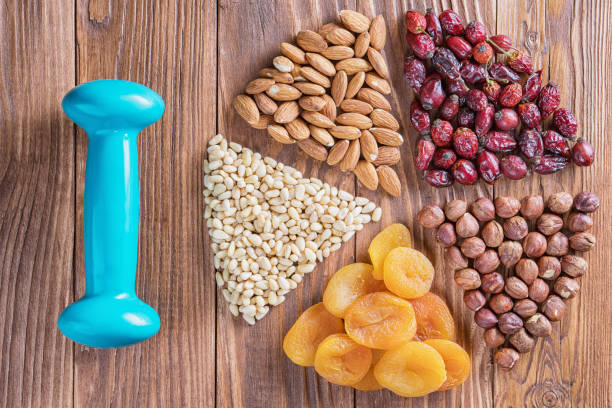
5. Bananas Are a Must-Have
Bananas are packed with carbohydrates, which makes them an excellent source of energy.
When you exercise, your body uses up its glycogen stores, which are essentially your body’s energy reserves.
Eating a banana after exercise helps replenish these stores and gives your body the energy it needs to function properly.
Apart from providing energy, bananas are also rich in essential vitamins and minerals. They are a great source of vitamin C, which helps support a healthy immune system, as well as vitamin B6, which is important for brain function and the production of red blood cells.
Bananas also contain potassium, which is essential for maintaining healthy blood pressure and regulating fluid balance in the body.
Another reason why bananas are a must-have after exercise is that they are easy to digest.
After a workout, your body is in a state of recovery and needs nutrients that can be quickly and easily absorbed. Bananas are a great option because they are high in fiber, which helps keep you feeling full and satisfied, but they are also easily digestible, meaning that your body can quickly and efficiently absorb the nutrients it needs.
Perhaps, one of the biggest benefits of bananas after exercise is their ability to help prevent muscle cramps. Their high potassium levels help them play a key role in muscle function. When your potassium levels are too low, your muscles can become fatigued and cramp up. Eating a banana after exercise helps replenish your potassium levels, which can help prevent muscle cramps and keep you feeling strong and energized.
It is noteworthy that bananas are a convenient and affordable post-workout snack. They are widely available, easy to transport, and require no preparation, making them the perfect on-the-go snack for gym and fitness enthusiasts.
Whether you are coming straight from the gym or need a quick snack to refuel during a busy day, bananas are a great option that you can always rely on.

6. Opt for Greek Yoghurt
Greek yogurt is a great post-workout snack because it’s high in protein and low in sugar.
Protein is essential for rebuilding and repairing muscle tissue, which is why it’s important to consume it after a workout.
Greek yogurt is also a good source of calcium, which is important for maintaining strong bones and teeth.
Compared to regular yogurt, Greek yogurt has a thicker, creamier texture and a tangy flavor. This is because it has been strained to remove the whey, which is the liquid that separates from the curd during the yogurt-making process. This straining process removes some of the lactose and sugar, making Greek yogurt lower in carbohydrates than regular yogurt.
Another benefit of Greek yogurt is that it contains probiotics.
Probiotics are live bacteria and yeasts that are good for your digestive system. They help keep your gut healthy by balancing the bacteria in your intestines. This can lead to better digestion, improved immunity, and a reduced risk of certain diseases.
When choosing Greek yogurt, look for a brand that has live and active cultures. These are the probiotics that will help keep your gut healthy.
Some brands may also add sugar or artificial flavors to their yogurt, so be sure to read the label and choose a plain, unsweetened variety.
You can enjoy Greek yogurt on its own or use it as a base for smoothies, dips, and dressings.
For a simple post-workout snack, mix Greek yogurt with fresh berries or sliced banana.
You can also add a sprinkle of nuts or granola for some crunch.

7. Try Quinoa
Quinoa is a superfood packed with essential nutrients that can help improve your overall health and fitness.
Quinoa is a seed high in protein, fiber, vitamins, and minerals. It is a complete protein — it contains all nine essential amino acids that our bodies need to function correctly. This makes it an ideal food source for athletes and gym-goers who need to build and repair muscle tissue after a workout.
A single cup of cooked quinoa contains about eight grams of protein, which is almost as much as a cup of milk.
Quinoa is also high in fiber. This means it can help regulate your blood sugar levels and keep you feeling full for longer. A fiber-rich diet is important for gym enthusiasts striving to lose weight or maintain a healthy weight.
Quinoa is also rich in magnesium, which is essential for muscle and nerve function. Athletes and gym goers often lose magnesium during exercise through sweat, so consuming quinoa after a workout can help replenish your magnesium levels.
Another benefit of eating quinoa after exercise is its high antioxidant content. Antioxidants help protect your cells from damage caused by free radicals, which are produced during exercise. This can help reduce inflammation in the body, leading to pain and discomfort after a workout.
Quinoa is also rich in vitamins and minerals like vitamin B2, iron, and phosphorus, all of which are important for maintaining good health.
Among the best things about quinoa is its versatility. You can eat it hot or cold, as a salad, a side dish, or even as a breakfast food. You can add it to your favorite smoothie, mix it with veggies, or use it as a base for a protein bowl. The possibilities are endless, making it easy to incorporate quinoa into your diet.

8. Drink Chocolate Milk
Chocolate milk is not just a delicious treat, it’s also a great recovery drink. Here’s why:
Chocolate Milk Is a Great Source of Protein
You already understand that protein is essential for building and repairing muscle tissue, which is why it is a vital component of your post-workout diet. And while there are plenty of protein powders and supplements on the market, chocolate milk is a much more affordable and convenient option.
Studies have shown that chocolate milk is just as effective as many commercial sports drinks when it comes to post-workout recovery.
Another recent study found that cyclists who drank chocolate milk after a workout had improved muscle recovery and could cycle longer in a subsequent workout compared to those who drank a carbohydrate-only drink.
But it’s not just the protein in chocolate milk that makes it a great post-workout drink. It also contains carbohydrates, which are essential for replenishing the glycogen stores in your muscles.
When you exercise, your body uses glycogen as a source of energy. Replacing those stores after a workout is important for preventing muscle fatigue and soreness.
Chocolate milk also contains a good balance of electrolytes like sodium and potassium, which are lost through sweat during exercise. Replacing these electrolytes is important for maintaining hydration and preventing cramping.
Understandably, not all chocolate milk is created equal. If you seek to use it as a post-workout drink, choose a low-fat or skim milk option to avoid consuming too much-saturated fat. Better yet, choose a brand of chocolate milk that doesn’t have too much-added sugar.
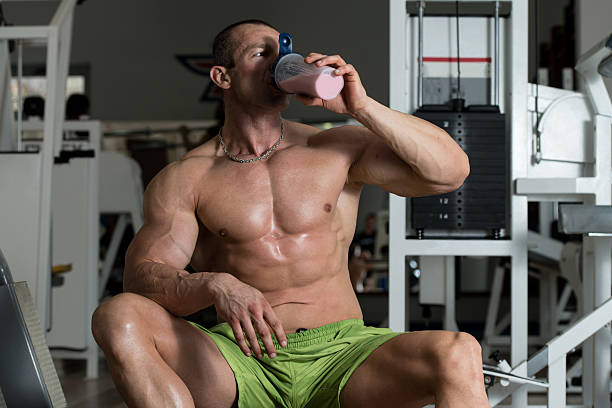
9. Don’t Forget About Vegetables
Vegetables provide essential nutrients that aid in muscle recovery and growth.
After a workout, your body is vulnerable, and consuming vegetables can help provide your body with the nutrients it needs to recover.
Vegetables such as broccoli, spinach, and kale are rich in vitamins and minerals such as vitamin C, vitamin K, and potassium, which are essential for muscle recovery.
Secondly, vegetables are low in calories and high in fiber, making them an excellent addition to any post-workout meal.
After a workout, your body needs to replenish its glycogen stores, and eating vegetables can help provide your body with the necessary carbohydrates to do just that.
The fiber in vegetables can also help slow down the digestion of carbohydrates, preventing a sudden spike in blood sugar levels.
Vegetables also contain antioxidants that help reduce inflammation caused by exercise.
Exercise can cause muscle damage and inflammation, which is why consuming foods high in antioxidants, such as vegetables, can help reduce inflammation and promote faster recovery. Lastly, vegetables are an excellent source of hydration.
After exercise, your body is dehydrated, and consuming foods high in water content can help replenish lost fluids.
Consider vegetables like cucumber, lettuce, and celery because they are high in water content and can help rehydrate your body.

10. Avoid Processed Foods
This is a no-brainer.
You’re probably aware of the importance of a healthy diet in achieving your fitness goals. While you may be tempted to indulge in processed foods after a workout, it’s crucial to avoid them. Here’s why:
Processed Foods are Often High in Sugar and Unhealthy Fats
These ingredients can lead to a spike in your blood sugar levels, causing an insulin response that promotes fat storage. This can counteract the hard work you put in at the gym and hinder your progress towards your fitness goals.
Processed Foods Are Often Stripped of Essential Nutrients
Your body needs essential nutrients to recover after a workout.
Essential nutrients are often high in calories but low in vitamins, minerals, and fiber, making them a poor choice for post-workout nutrition.
Processed Foods Can Cause Inflammation in the Body
Workout-inflicted inflammation can lead to a host of health problems.
Inflammation can compromise your immune system, making it harder for your body to fight off infections and diseases. It can also lead to joint pain and other chronic health conditions.
Instead of processed foods, opt for whole, nutrient-dense foods to help your body recover and thrive after a workout.

The Bottom Line
Hands down, post-workout nutrition is crucial for muscle recovery and growth.
By following these ten nutritious dining tips, you can fuel up like a pro and crush your fitness goals in no time.
Remember to hydrate with water, eat protein and carbohydrates, snack on nuts, eat bananas, opt for Greek yogurt and quinoa, drink chocolate milk, include vegetables, and avoid processed foods.
Looking to build muscle and endurance without breaking the bank? Don’t look any further.
Subscribe to Kloud Iron’s 28-day fitness program and begin your journey toward optimal mental health and physical fitness.
To learn more about Kloud Iron Fitness Hub’s offers, contact us today or message/follow us on Facebook and Instagram. We are also available on YouTube.


1 Comment
Buat Akun di Binance
2 months agoYour article helped me a lot, is there any more related content? Thanks!